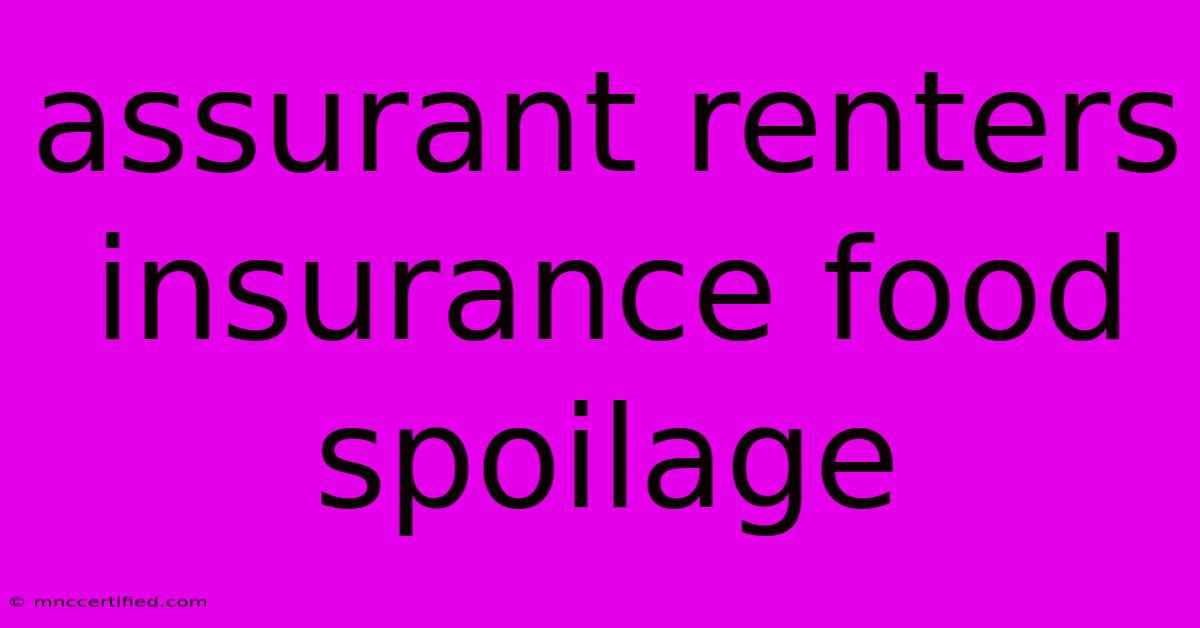Assurant Renters Insurance Food Spoilage

Table of Contents
Renters Insurance and Food Spoilage: What You Need to Know
As a renter, you're responsible for protecting your belongings, including your food. But what happens if your food spoils due to an unexpected event covered by your renters insurance? This article will guide you through the intricacies of renters insurance and food spoilage, so you're prepared in case the unexpected occurs.
Renters Insurance Coverage for Food Spoilage
While renters insurance generally covers your personal property against perils like fire, theft, and vandalism, food spoilage is not always automatically covered. This is where understanding the specific terms of your policy becomes crucial.
Here's what you need to know:
- Peril Coverage: Your policy might cover food spoilage only if it results from a covered peril like a power outage, burst pipes, or a fire.
- Limits and Deductibles: Even if food spoilage is covered, there may be limits on the amount your insurer will pay and a deductible you need to pay before coverage kicks in.
- Sublimits: Some policies have sublimits for specific types of property, like food. These limits might be much lower than the overall coverage amount.
Understanding Your Policy
To determine whether your renters insurance covers food spoilage, you must carefully review your policy documents. Pay close attention to:
- Covered perils: Identify which events your policy covers.
- Exclusions: Look for any specific exclusions that might apply to food spoilage.
- Limits and deductibles: Understand the financial implications of a claim for spoiled food.
It's advisable to contact your insurance provider directly to clarify any doubts about food spoilage coverage. They can provide you with specific details about your policy and ensure you're protected.
Tips for Minimizing Food Spoilage
While renters insurance can offer some protection, it's always beneficial to take proactive measures to minimize food spoilage:
- Keep a well-stocked freezer: A full freezer helps maintain a consistent temperature even during power outages.
- Invest in a backup generator: This can keep your refrigerator running during power outages.
- Use reusable ice packs: They can keep food cold for a longer time if you need to transport groceries or evacuate.
- Organize your refrigerator: Keep perishable items towards the front so you use them before they spoil.
- Check expiration dates regularly: Avoid throwing out food that has already gone bad.
Protecting Your Food and Your Wallet
Understanding your renters insurance policy and taking proactive steps to prevent food spoilage can help you avoid unexpected financial burdens. By being informed and prepared, you can ensure your peace of mind and protect your valuable possessions.
Remember, it's always best to consult with your insurance provider for the most accurate and up-to-date information regarding your specific policy and coverage.

Thank you for visiting our website wich cover about Assurant Renters Insurance Food Spoilage. We hope the information provided has been useful to you. Feel free to contact us if you have any questions or need further assistance. See you next time and dont miss to bookmark.
Featured Posts
-
Health Insurance For Transplant Patients
Nov 08, 2024
-
Live Stream Chelsea Vs Fc Noah Conference League
Nov 08, 2024
-
How To Find If Someone Has Car Insurance
Nov 08, 2024
-
Del Monte Unveils New Snack Range With Natural Ingredients
Nov 08, 2024
-
Unoccupied Commercial Property Insurance
Nov 08, 2024